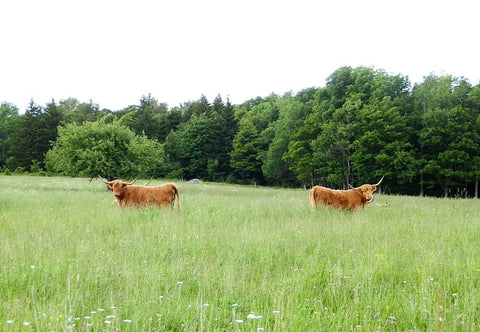The Truth About Hormones and Antibiotics In Your Meat
The Truth About Hormones and Antibiotics In Your Meat
Hormones and antibiotics in meat have become hot-button topics in recent years. For decades the meat and dairy industries have added synthetic estrogen and testosterone to increase the size of an animal and drastically escalate milk production. Typically a farmer implants a small pellet in the livestock's ear while it is young. The device then releases hormones for the duration of the animal's life. Additionally, many animals are fed a diet laced with the same synthetic hormones to ensure they grow at a rapid, and unnatural, pace. It's no surprise this ongoing practice is terrible for animals, as often their legs fail to support the added weight, and their internal organs are not developed to keep up with the packed-on pounds.

It's short-sighted to think the hormones in food don't negatively affect us. Various negative impacts of ingesting hormone-laced meat have become more and more evident in the past decade, and consumers are beginning to demand a change. Sure, a variety of naturally-occurring hormones are produced by our bodies that are essential for the development of muscle tissue, but antibiotics in meat have been found to increase the risk of prostate and breast cancers, early menstruation, and breast development in young girls, and rapid weight gain. But what can be done to combat these problems?
Eating hormone-free meat is one logical place to start. Get used to checking the label on product packaging and seek out labels such as "100 percent certified organic" and "Free range, no antibiotics," which signify that the item falls into the antibiotic-free meat category. Do the research, as often hormone-free and antibiotic-free meats are available online if there are no options in your area.
Seeking out free-range, hormone-free meat can also positively impact the environment. Typically smaller, diverse sustainable farms produce hormone-free options. On these farmsteads, manure from hormone-free animals is often used as compost for improving the growth of gardens, as well as used to naturally fertilize surrounding soil. Industrial farms produce such a massive amount of manure it becomes a serious health risk, as it badly pollutes the air and contaminates wells.
Every day it’s becoming more difficult for doctors to treat human diseases as bacteria are becoming more resistant to antibiotics. Excessive use by agricultural companies aiming at unnatural animal growth or covering up inadequate living conditions for the animals cannot be compared to the importance of the ability to take care of our families, communities, and the world.
You can start now to keep you and your family healthy by deciding to support your health, the environment, and animal care, by only consuming hormone-free and antibiotic-free meats.
